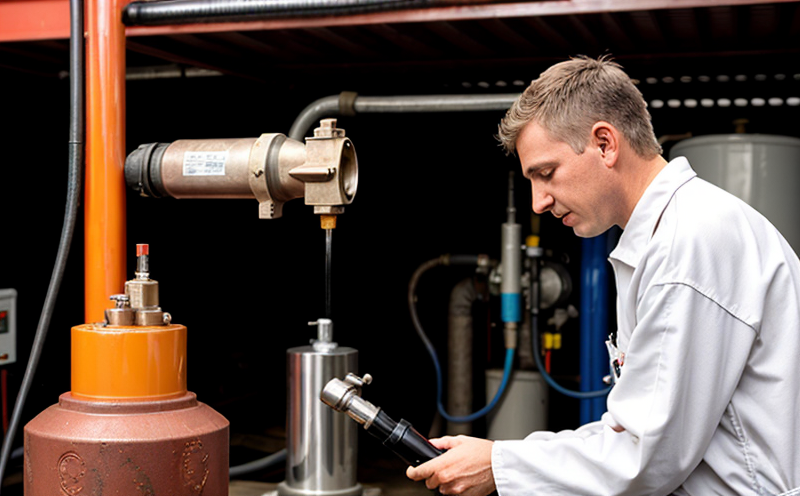ISO 20846 Sulfur Content Testing by Fluorescence Spectroscopy
The ISO 20846 standard provides a robust method for determining the sulfur content in aviation fuels and lubricants using fluorescence spectroscopy. This technique is particularly advantageous due to its non-destructive nature, high precision, and low detection limits, making it ideal for ensuring compliance with stringent fuel quality specifications.
In aerospace and aviation industries, sulfur content plays a critical role in determining both the performance and safety of fuels. High levels of sulfur can lead to corrosion issues within aircraft engines, reducing their operational lifespan and efficiency. By adhering to standards like ISO 20846, manufacturers and suppliers ensure that their products meet the necessary quality thresholds.
The process involves several key steps: first, a sample is prepared according to specified guidelines to ensure accurate results. This might include dilution or other pre-processing steps depending on the fuel type being tested. Once prepared, the sample is introduced into the spectroscopic instrument where it interacts with ultraviolet light. The resulting fluorescence emission spectrum is then analyzed to quantify sulfur content.
The use of fluorescence spectroscopy offers several advantages over alternative methods such as gravimetric analysis or titrimetry. Not only does it provide faster results but also allows for simultaneous measurement of multiple components if required. Additionally, this method can detect trace amounts of sulfur down to parts per million levels, which is crucial given modern fuel specifications.
Compliance with ISO 20846 ensures not just regulatory adherence but also contributes significantly towards maintaining the integrity and reliability of aircraft operations worldwide. It helps prevent potential incidents caused by substandard fuels while promoting sustainable practices that minimize environmental impact throughout the aviation lifecycle.
- Emissions Reduction: Lower sulfur content in fuel directly translates to reduced emissions, contributing positively to global efforts aimed at combating climate change.
- Resource Efficiency: By ensuring high-quality lubricants and fuels, this testing method supports efficient resource utilization across the supply chain.
- Operational Safety: Accurate sulfur content measurements enhance operational safety by eliminating risks associated with degraded materials.
In summary, ISO 20846 sulfur content testing using fluorescence spectroscopy is an essential service for maintaining optimal fuel and lubricant quality in the aerospace and aviation sectors. Its precision, speed, and reliability make it a cornerstone of modern quality assurance programs.
Applied Standards
The ISO 20846 standard is widely recognized and utilized within the global aviation industry for its accuracy and consistency in measuring sulfur content. This international standard has been adopted by numerous organizations worldwide, including leading aircraft manufacturers, airlines, and regulatory bodies.
To ensure reliability across different laboratories, ISO 20846 specifies detailed procedures for sample preparation, instrument calibration, and data interpretation. Compliance with these guidelines ensures that results are comparable internationally, facilitating seamless collaboration between industry stakeholders.
For instance, when testing jet fuel (Jet A-1), the procedure outlined in ISO 20846 allows operators to detect sulfur concentrations as low as 5 parts per million (ppm). This level of precision is critical given that even small variations in sulfur content can significantly impact engine performance and longevity.
Similarly, for turbine oil used in aircraft engines, the standard provides specific instructions on how to prepare samples and interpret fluorescence spectra. By following these protocols, technicians can accurately assess the quality of lubricants across various components like bearings, gears, and hydraulic systems.
The application of ISO 20846 extends beyond just aviation fuels and oils; it also applies to other types of petroleum products where sulfur content needs to be monitored closely. This includes diesel fuel for ground support equipment (GSE) used at airports as well as marine bunker fuels.
Overall, adherence to this standard enhances the overall quality control processes within these industries, ensuring that all participants meet stringent environmental and safety standards set forth by regulatory authorities.
Environmental and Sustainability Contributions
The ISO 20846 sulfur content testing method contributes significantly to environmental sustainability efforts in several ways:
- Emission Reduction: Lowering the sulfur content in aviation fuels helps reduce harmful emissions such as sulfur dioxide, which is a major contributor to acid rain and respiratory diseases.
- Biodiversity Preservation: By minimizing pollution from sulfur-containing compounds, this testing method supports efforts aimed at preserving ecosystems around airports and other areas where aviation activities take place.
- Resource Conservation: Ensuring high-quality fuels through precise sulfur content measurements leads to more efficient combustion processes, thereby conserving non-renewable resources like jet fuel.
In addition to these benefits, ISO 20846 also promotes sustainable practices throughout the aviation lifecycle. From production and distribution to maintenance and decommissioning, maintaining strict quality control measures ensures that all stages of operation contribute positively towards environmental stewardship.
Moreover, by adhering to international standards like ISO 20846, airlines and other stakeholders can demonstrate their commitment to sustainability initiatives. This not only enhances corporate image but also fosters trust among passengers who increasingly prioritize eco-friendly travel options.
Competitive Advantage and Market Impact
The ability to accurately measure sulfur content in aviation fuels and lubricants provides significant competitive advantages for companies operating in the aerospace and aviation sectors. By ensuring compliance with stringent quality standards, businesses can:
- Enhance Reputation: Meeting or exceeding regulatory requirements builds credibility among customers, stakeholders, and regulatory bodies.
- Reduce Risks: Precise testing minimizes the risk of product failures due to substandard materials, leading to increased operational reliability.
- Increase Efficiency: Efficient resource utilization translates into lower costs and improved profitability for companies adopting advanced quality control practices.
Furthermore, adherence to ISO 20846 demonstrates a company's commitment to sustainability, which is becoming increasingly important in today’s market. Consumers are more aware of environmental issues than ever before, and businesses that prioritize green initiatives tend to attract environmentally conscious customers.
In the competitive landscape of aerospace and aviation, where safety and performance are paramount, precise sulfur content testing plays a vital role. Companies leveraging this service can position themselves as leaders in quality assurance, thereby gaining a competitive edge over competitors who may not invest equally in these areas.





